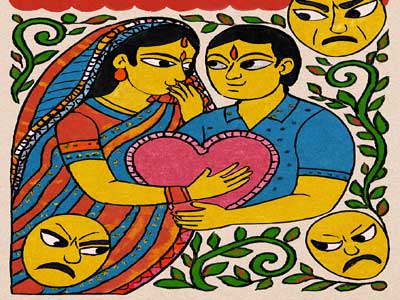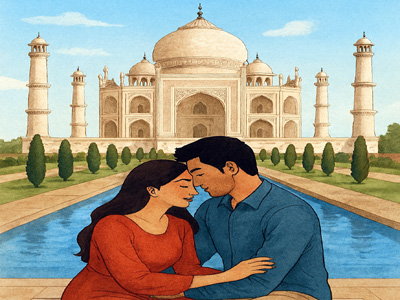She stood in the courtroom, not with questions in her eyes but with a quiet fire burning in them. Her ‘crime’? Choosing to live with the man she loved. For society, she was ‘immoral’; for herself, she was nothing less than a freedom fighter. With trembling defiance, she asked: “Must love carry a certificate to be legitimate?”
In her voice echoed centuries of silenced pain. This was not the story of a single woman; it was a blow struck at the very foundations of our social order. Would justice itself bow to the hypocrisy of tradition?
Read in Hindi: मोहब्बत का 'गुनाह'? वह सच जिससे डरता है समाज...!
A philosopher once wrote, “Sex is a beautiful art of human life, brushed with the colours of love, intimacy, and trust.” The greatest game is not played on fields of football or cricket, but in the tender, turbulent arena of hearts. Human life without love is incomplete, yet society walls it in with fear, shame, and endless prohibitions, branding it as sin. The guardians of morality forget: “Love is a river into which all must plunge; whatever vessel one takes, there is no shore to cling to.”
People dream of romance, flirtation, secret meetings under the stars, even forbidden marriages. And yet, how often are such fragile desires crushed under the weight of ‘honour’ and ‘tradition’? The truth is simple: love and intimacy are the wellsprings of creativity. Without them, there would be no poetry, no art, no sculpture, no music, no civilisation worth remembering.
Prof Paras Nath Choudhary observes, “Sex is not merely a physical act; it is the celebration of trust and love between two souls. It is almost impossible to imagine a world stripped of intimacy and affection. Indeed, there is no prayer greater than love, no shrine holier than the meeting of two hearts.”
Religion, across ages, has shaped and scarred our understanding of love. Some faiths condemn it, smothering believers in shame and guilt; others sanctify it as mystery and spiritual union. But one truth holds: where a society denies healthy sexual expression, even its prayers lose sincerity. As social activist TP Srivastava says, “Sex, when embraced with respect and consent, is the sacred bond that binds human hearts.”
In the modern world, sex itself has become a kind of new faith. People practice it in their own rituals and with their own devotions. Without the solace of physical intimacy, the human mind drifts into unrest. It is time we recognise that love and sex are not sins but strengths, forces that sustain humanity. At a higher plane of awareness, one sees, “The union of body and soul is the essence of true love; all else is performance, pretence, illusion.”
Contraception freed humanity from the tyranny of fear. Women stepped beyond domestic walls, carving identities for themselves. Divorce, live-in partnerships, single parenthood, same-sex love, once unthinkable, are now part of our evolving social fabric. These changes unsettle many, bruise male egos, and fracture traditional families, yet they cannot be denied. New relationships, new definitions, are not threats; they are expansions of the human spirit. For as the old wisdom says, “The river of time flows neither backwards nor still; those who remain stagnant are lost to its current.”
Once, India’s own Kama Sutra celebrated eroticism as a festival of joy. Later, colonial morality painted it as sin. Now is the time to return to our roots, to reclaim sexuality not as a crime, but as an expression of consent, intimacy, and soulful union.
Divorce should not be branded as failure, but understood as the search for a truer bond. Family need not be only joint or nuclear; it can be chosen, created, or redefined. After all, “Home is where the heart belongs; no one ever fell in love with bare walls.” Research shows that where freedom thrives, happiness flourishes, and crime diminishes. Love, whether romantic, filial, or platonic, is the cornerstone of all relationships. With education, dialogue, and openness, we can build a stronger, kinder society.
In the end, love and intimacy are not luxuries; they are the lifeblood of human existence. The path forward is not to suppress them but to honour and celebrate them. As a poet reminds us, “Love is not rebellion, it is humanity’s truest universe.”
















Related Items
Love etched in marble, Blossoming on screens
From flood fear to freedom: A new bridge of hope over Kosi…
Legal Recognition for Love: Need to lower the age limit to 15 years!